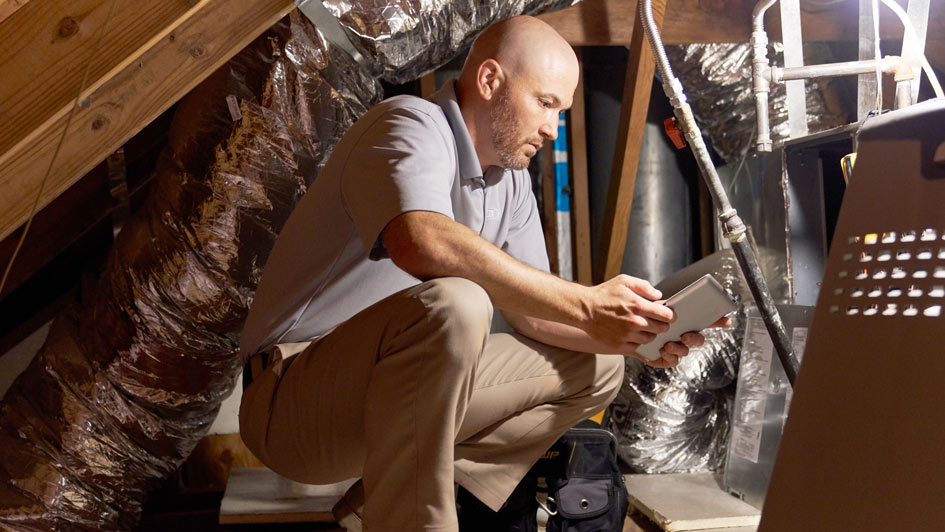
Where you aware that more than 50% of your home’s energy costs are for your heating and cooling? This is why it’s so important to have an energy-efficient HVAC system.
Furnace efficiency standards were last updated to an Annual Fuel Utilization Efficiency (AFUE) rating of 80% in 2015. This rating system measures how effective your furnace is at combusting natural gas into heat. An AFUE rating of 80% means your furnace will waste about 20% of the fuel it uses while generating heat.
In 2022, the Biden Administration devised new energy-efficiency standards for residential gas furnaces that would greatly decrease emissions, save customers money and stimulate sustainability.
This proposal is projected to:
- Save Americans $1.9 billion annually.
- Cut carbon emissions by 373 million metric tons and methane emissions by 5.1 million tons over the next 25 - 30 years, the equivalent of what 61 million homes emit each year.
Starting in 2029, the updated rule would mandate all new gas furnaces to feature AFUE ratings of 95%. This means furnaces would convert nearly 100% of the gas into usable heat.
So what does all of this mean for your existing furnace in 2023? As of now, next to nothing, as the proposed rule wouldn’t go into effect until 2029 at the earliest and does not affect furnaces that are already in use.
But if you need furnace replacement in soon, highly energy-efficient furnaces are ready and available. Find out how these furnaces can save you money on your utility bills.
Guide to Condensing Furnaces
How Condensing Furnaces Work
A condensing furnace is a type of heating system that uses a secondary heat exchanger to collect wasted heat from the furnace's exhaust gases. This decreases the quantity of energy wasted, enhances energy efficiency and lowers carbon-monoxide emissions. It also demands less natural gas to create the same amount of heat compared to other types of furnaces.
How Condensing Furnaces Differ from Non-Condensing Furnaces
The biggest difference between a condensing furnace and a non-condensing furnace is that the former uses a secondary heat exchanger to capture any wasted heat from its exhaust gases, while the other does not.
Expected Longevity of a Condensing Furnace
The life span of a condensing furnace will depend on the brand, model and other factors. Generally speaking, a condensing furnace is likely to last between 10-20 years with sufficient maintenance and regular service. If you put off scheduled maintenance, the equipment may have a significantly shorter life span.
Why Condensing Furnaces Require a Higher Investment
Usually, condensing furnaces enhanced precision is significantly more efficient than standard, single-speed furnaces, as it only uses the minimum amount of energy required to heat your home, which subsequently saves money on your utility bills.
The majority of variable-speed furnaces are condensing furnaces, although some are available in non-condensing models with lower AFUE ratings. If a manufacturer wants a furnace to be classified as a condensing furnace, it must offer an AFUE rating of 90% or higher.
Do Variable-Speed Furnaces Run All the Time?
A variable-speed furnace doesn’t run all the time. Rather, it runs at different speeds according to the temperature in your Frederick home as well as the amount of energy it needs to reach that temperature.
When sufficient energy is required to maintain your set temperature level, the furnace will shift to a higher speed to manage the higher demand. Doing this will ensure more efficient heating in your home while also providing quieter operation.
Guide to Two-Stage Furnaces
Two-Stage Furnaces: What They Are and How They Work
A two-stage furnace is a type of heating system that utilizes two different stages of operation — high and low. During the low stage, the furnace runs at a reduced capacity as a way to maintain the desired temperature at your home more efficiently. During the high stage, the furnace will instead function at peak capacity to satisfy demands for increased heat. With a two-stage furnace, you can maintain greater energy efficiency and stable temperatures everywhere in your home.
While two-stage furnaces are very efficient, not all all models are condensing furnaces.
Does a Two-Stage Furnace Run All the Time?
A two-stage furnace won’t run all the time. In the low stage of operation, the furnace performs at limited capacity in order to sustain a desired temperature more efficiently within your home. When additional energy is needed to maintain the set temperature, the unit switches to its high stage and runs at full capacity. As a result, two-stage furnaces are able to help reduce energy costs without operating constantly.
Contrasting Two-Stage and Variable-Speed Furnaces
Two-stage furnaces have two stages of operation, low and high. During the low stage, the furnace runs at reduced capacity to help sustain a desired level of comfort within your home. When more warmth or cooling is desired, the furnace will switch to its high stage and operate at full capacity.
Variable-speed furnaces, meanwhile, can operate at multiple speeds in order to maintain a desired temperature more consistently at home. Such precise functionality can also help reduce energy costs, as it is not constantly running on full power like many two-stage furnaces do.
Differences Between One- and Two-Stage Furnaces
One-stage furnaces have a single stage of operation and operate either at full power or not at all. As a result, the furnace runs constantly in order to maintain a desired level of comfort within your home.
Two-stage furnaces, on the other hand, have two stages of operation, low and high. While in the low stage, the furnace runs at lower capacity in order to maintain the desired temperature more efficiently. When a greater demand for warmth or cooling is desired, the furnace will shift to its high stage and operate at maximum capacity.
Make Your Furnace Installation Appointment with May's Heating & Air Today
Making sense of modern furnace technology can be confusing. That’s why May's Heating & Air specialists are here to help with a no-obligation, no-pressure quote for furnace installation. We’ll assess your home, your heating needs and your budget before helping you find the ideal solution. Call us at 301-690-0397 to get started today!
